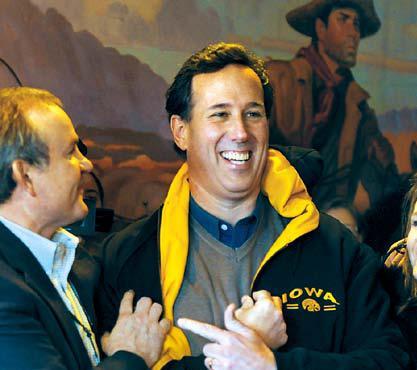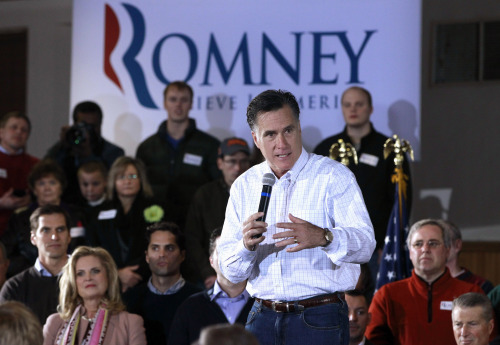WASHINGTON (AP) ― Republican presidential candidates were making their final pitches Monday, one day before Iowa voters gather in caucuses to become the first in the U.S. to chose a favorite to challenge President Barack Obama in the November election.
Polls show former Massachusetts Gov. Mitt Romney locked in a close race with Texas Rep. Ron Paul, with former Pennsylvania Sen. Rick Santorum rising swiftly to challenge them.
Polls show former Massachusetts Gov. Mitt Romney locked in a close race with Texas Rep. Ron Paul, with former Pennsylvania Sen. Rick Santorum rising swiftly to challenge them.


The Tuesday caucus meetings in Iowa could further define the seven-candidate field of Republicans seeking the party’s nomination. They are the first in a grueling series of state-by-state primary elections and caucuses that stretch to the end of June.
Only three or four candidates typically make it out of Iowa with enough momentum and money to continue in the race.
The fight for the nomination has been defined not only by the issues but also by the candidates’ contention that they are best placed to keep a deeply vulnerable Obama from winning a second White House term. He is weighed down with a stagnant U.S. economy that has been slow to recover from the 2007-2009 Great Recession.
With roughly half of Iowa’s likely caucus attendees still undecided, an unexpected outcome remained a stark possibility for the party that has so far failed to coalesce around Romney, the well-financed and patrician easterner who is the favorite of the Republican establishment. But with Paul widely seen as a far weaker candidate nationwide, Romney was showing confidence he would move out of Iowa with momentum.
He is the favorite in the closely watched New Hampshire primary election which comes next on Jan. 10.
Santorum hacked away at Romney on Monday, discounting the former business executive’s emphasis on his private-sector experience. “We are not looking for executive experience. We are looking for a commander in chief,” Santorum told a campaign event.
Sounding increasingly optimistic, Santorum was looking beyond Tuesday’s vote.
“I look forward to building on our momentum from Iowa to again defy expectations in New Hampshire,” he said, announcing the endorsement of several New Hampshire politicians.
But Romney expects to win. He told a raucous crowd in Marion, Iowa, on Monday that the caucuses will kick off a process that will make him the Republican nominee.
Even though Romney does not have the support of a plurality of likely Iowa caucus-goers, he is seen by them as the Republican most likely to defeat Obama in the general election. Romney has been slow to win broad support in the party because of his moderate positions on social issues in the past and reforms to medical care that were instituted in Massachusetts when he was governor.
That overhaul of the health system served, to a degree, as the blueprint of the national reforms Obama pushed through Congress early in his term. Most Republican voters want to see the health care reforms rescinded, especially the requirement that everyone buy medical insurance.
Romney has roughly the same amount of support in polls as he did in 2008, when he lost the race with 25 percent of the Iowa vote amid skepticism over his Mormon faith and his reversals on some social issues. This year, he has been counting on the Republican conservative base splintering in a multi-candidate field.
Paul and Santorum were fighting against the notion in Republican circles that their bases of support are narrow and that neither would be able to put together the diverse voting coalition necessary to beat Obama. The libertarian-leaning Paul attracts those who like his message of states’ rights and limited central government, while Santorum ― an anti-abortion crusader ― is popular among Christian conservatives who make up a large segment of the Republican Party base.
In contrast, Romney has styled himself as a Republican able to attract a broad spectrum of voters.
Iowa’s conservatives have yet to coalesce around a single candidate. The state’s large evangelical bloc is splitting support among Santorum, former House Speaker Newt Gingrich, Texas Gov. Rick Perry and Minnesota Rep. Michele Bachmann.
Gingrich, who shot to the top of the polls but has since taken a steep tumble, told reporters Monday that the “volume of negativity” by his rivals and their allies had done its damage.
“I don’t think I’m going to win,” he said.
Gingrich later offered a more upbeat assessment after one of his precinct captains complained during a telephone conference calll that he was dispirited by the prediction.
Appearing Monday night in Davenport, Gingrich urged supporters to help him and “we may pull off one of the great upsets in the history of the Iowa caucuses.”
Gingrich has been the target of millions of dollars worth of negative advertisements by political action committees aligned with other candidates. Still, the candidate predicted he would do well enough to continue on to the coming contests in New Hampshire and South Carolina.
Gingrich, Perry and Bachmann, all three deeply conservative candidates, rose to the top of the Republican field over the past months as alternatives to the more moderate Romney, but they quickly faded under closer media and voter scrutiny.
The seventh Republican, former Utah Gov. Jon Huntsman, is not contesting Iowa and has focused almost solely on New Hampshire.
-
Articles by Korea Herald




![[Graphic News] Beer the most favored alcoholic drink by Koreans](http://res.heraldm.com/phpwas/restmb_idxmake.php?idx=644&simg=/content/image/2024/05/09/20240509050765_0.gif&u=)









![[Weekender] Pet food makers bet big on ‘recession-free’ pet food market](http://res.heraldm.com/phpwas/restmb_idxmake.php?idx=652&simg=/content/image/2024/05/10/20240510050754_0.jpg&u=20240511163252)




![[What to play] Musical tributes to family in the month of family](http://res.heraldm.com/phpwas/restmb_idxmake.php?idx=642&simg=/content/image/2024/05/09/20240509050795_0.jpg&u=)